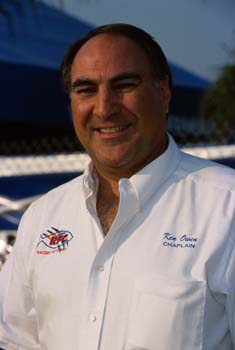FAITH IN THE FAST LANE – THE UNANSWERABLE QUESTION
WHY?
No other question is more common or seems more relevant in the light of
extreme tragedy than this single-syllable inquiry. Occasionally in the
world of racing, this question is asked from hurting hearts with
painful concern. Having been a minister for 35 years, I’ve been granted
the opportunity of helping people face the tragedy of death on many
occasions. While never a pleasant experience, I have repeatedly seen
God comfort the deep hurt to which we are all so vulnerable during such
times.
Two very important issues need to be settled at the very onset when
coping with the tragedy of death. First, we must realize that God does
not will tragedy to take place. Second, it is sometimes best not to ask
"why."
Christianity teaches that Christ was sent into this world that we might
have life, and that we might have it more abundantly. God is a God of
life; he is concerned with life and wants us to know and enjoy life
more fully.
Why?

No other question is more common or seems more relevant in the light of extreme tragedy than this single-syllable inquiry. Occasionally in the world of racing, this question is asked from hurting hearts with painful concern. Having been a minister for 35 years, I’ve been granted the opportunity of helping people face the tragedy of death on many occasions. While never a pleasant experience, I have repeatedly seen God comfort the deep hurt to which we are all so vulnerable during such times.
Two very important issues need to be settled at the very onset when coping with the tragedy of death. First, we must realize that God does not will tragedy to take place. Second, it is sometimes best not to ask "why."
Christianity teaches that Christ was sent into this world that we might have life, and that we might have it more abundantly. God is a God of life; he is concerned with life and wants us to know and enjoy life more fully.
The Bible teaches us that due to man's moral fall from the beginning of time, man throughout all of earth's history would be subject to death. It was therefore appointed that man would one day face death—not because God desired it—but because we are accountable as a human race to the consequences of our own free-will. Therefore, death entered our world because of man's wrong, not as a result of God's choice.
We all know there are risks involved in motor racing. On occasion, racing faces a crisis point in the collision of risk and reason. God allows us the freedom of doing what we please in life, whether He ultimately approves or not. If we do things in life that contain a higher risk factor, then we are responsible for the consequences of that added level of risk. Many have paid such a price in years past—be it from motor racing, skydiving or playing sports. Not one of us has a guarantee beyond our next breath. That's simply a part of life that we all accept, whether we understand it or not, whether we like it or not. We cannot change this reality. We can only minimize the consequences by keeping ourselves free from any high-risk situations.
To those courageous warriors who have lost their lives in racing over the years, avoiding that risk was never an acceptable option. They knew the potential risks, and they willingly faced those risks with courage and honor. As mortal beings, we cannot ignore the principle of cause and effect, which simply means that some things will go wrong on occasion. Accidents do happen, and we are all vulnerable to this ongoing axiom of life. We must therefore accept the consequences of those risks and enjoy life as fully as we can.
I believe with all my heart that in every tragedy there is an answer to the question “why.” I also believe, however, that in very few instances will we ever know or be able to comprehend that answer. Thus, my advice to those who want to know why—don't ask.
God never promised that we would know the secrets of the ages or understand the reasoning behind every event in the history of mankind. He did, however, promise that "the God of all the earth will do right." In that promise we must learn to trust, and trust means we do not always know the end result or see the ultimate purpose in life’s many scenarios.
Having been around racing for 45 years, I have often heard a common statement among lovers of speed and competition. Almost without exception racers will say—"if I have to die some day, let me die doing what I love most in life." For those who have lost their lives in motor racing, that wish became a reality, just as they desired. Consider how few people in life will ever have that same opportunity.
The bottom line is this. None of us has the choice to determine whether we will experience physical death one day. The only choice available to us is whether we will be prepared to face death when it comes, not to ignore it or try to convince ourselves of personal invincibility
The loss of friends and loved ones is never an easy or pleasant experience, but we who remain must seek to find a positive and beneficial result from such tragedies—lest those who die, die in vain.
The positive contributions of one’s life can still produce beneficial results in our society long after that person is gone. There is no question that we all feel a great loss—but I want to challenge each of us to emphasize in our minds the gratefulness that we feel to have enjoyed these special people and what they contributed to our lives.
Gradually the hurt, the anger, and the sense of loss that we always feel will diminish—and God will give us the grace and courage to move on. But let us move on with thankfulness in our hearts—thankfulness for the positive contributions that these loving people made in our lives. In so doing, let your gratefulness for the past overcome the pain of the present—and thereby become your strength for the future. That’s what the grace of God is capable of doing in your life.




































